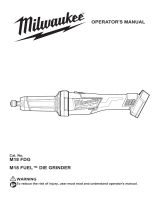
2
•
WORK AREA SAFETY
•
•
•
Keep work area clean and well lit. Cluttered or
dark areas invite accidents.
•
• Use extra care when using on stairs.
ELECTRICAL SAFETY
to settle dust.
• Do not pick up wet material. Do not use water
Do not use in the presence of explosive dust,
liquids or vapours.
Do not use where oxygen or anesthetics are used.
Do not allow to be used as a toy. Close attention
is necessary when used by or near children.
PERSONAL SAFETY
• Do not handle battery pack or dust extractor
with wet hands.
• Do not expose power tools to rain or wet condi-
tions. Water entering a power tool will increase the
risk of electric shock.
•
•
•
•
•
•
•
Use personal protective equipment. Always
wear eye protection. Protective equipment such
as a dust mask, non-skid safety shoes, hard hat or
hearing protection used for appropriate conditions
will reduce personal injuries.
Remove any adjusting key or wrench before
turning the power tool on. A wrench or a key left
attached to a rotating part of the power tool may
result in personal injury.
If devices are provided for the connection of
dust extraction and collection facilities, ensure
these are connected and properly used. Use of
dust collection can reduce dust-related hazards.
•
• Do not overreach. Keep proper footing and bal-
ance at all times. This enables better control of the
power tool in unexpected situations.
Avoid accidental starting. Ensure the switch is
Inserting battery pack in dust extractor that has the
switch on invites accidents.
•
•
•
USE AND CARE
•
of body away from openings and moving parts.
Use only as described in this manual. Use only
manufacturer’s recommended attachments.
Prevent unintentional starting. Ensure the switch
source and/or battery pack, picking up or carry-
ing the tool.
on the switch or energising power tools that have
the switch on invites accidents.
• Do not pick up anything that is burning or smok-
ing such as cigarettes, matches, or hot ashes.
• Do not pick up soot, cement, plaster or drywall
motor or be exhausted back into the air.
•
•
•
Use special care when emptying heavily loaded
tanks.
To avoid spontaneous combustion, empty dust
box after each use.
• Do not leave dust extractor unattended when
battery pack is installed. Remove battery pack
when not in use and before servicing.
• Disconnect the battery pack from the appliance
before making any adjustments, changing ac-
cessories, or storing appliance. Such preventive
safety measures reduce the risk of starting the ap-
pliance accidentally.
• Do not put any object into openings. Do not use
with any opening blocked; keep free of dust, lint,
Dust extractors have motors and other parts
that can produce sparks during normal use. Do
not use within 9 metres of areas where explosive
materials may be present (such as petrol pumps
and places where liquids like paint thinners,
cleaners, solvents, etc. are stored).
Do not use to pick up flammable or
combustible liquids such as petrol or use in
areas where they may be present.
IMPORTANT SAFETY INSTRUCTIONS
WHEN USING AN ELECTRICAL DUST EXTRACTOR, BASIC
PRECAUTIONS SHOULD ALWAYS BE FOLLOWED, INCLUDING THE
FOLLOWING: READ ALL INSTRUCTIONS BEFORE USING DUST EXTRACTOR.
BEFORE USING THE DUST EXTRACTOR, READ THIS OPERATOR’S MANUAL,
YOUR TOOL, BATTERY PACK AND CHARGER OPERATOR’S MANUALS, AND
ALL LABELS ON THE DUST EXTRACTOR, BATTERY PACK, CHARGER AND
TOOL. FAILURE TO FOLLOW THE WARNINGS AND INSTRUCTIONS MAY
RESULT IN ELECTRIC SHOCK, FIRE AND/OR SERIOUS INJURY.
The operation of a dust extractor can result in
foreign objects being blown into eyes, which
can result in eye damage. Always wear safety
goggles or glasses with side shield marked to
comply with AS/NZS 1337.1 when operating dust
extractor.
STAY ALERT. Watch what you are doing and use
common sense. Do not use dust extractor when
you are tired, distracted or under the influence of
drugs, alcohol or medication causing diminished
control.
Wear a dust mask or use a suitable dust
extraction solution when working in dusty
situations. Dust particles can harm your lungs.
To reduce the risk of health hazards from other
vapours or dust, do not vacuum carcinogenic,
toxic or hazardous materials such as asbestos,
arsenic, barium, beryllium, lead, pesticides or other
health endangered materials.
WARNING
• Do not let familiarity gained from frequent use
of tools allow you to become complacent and
ignore tool safety principles. A careless action can
cause severe injury within a fraction of a second.








